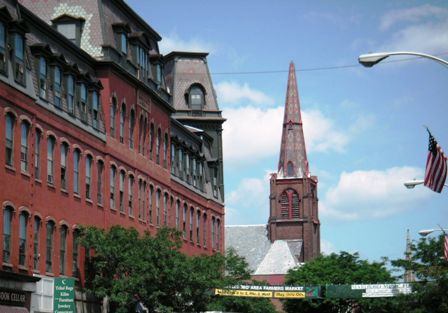
"People who like this sort of thing will find this the sort of thing they like." (Lincoln)
| |
| POSC 2103 US Government |
|
bureaucracy (ch 14)
We briefly interrupt our tour of the three branches of national government--Congress, the Presidency, and the courts--to consider the bureaucracy. The bureaucracy is taken up now, right after the Presidency, because the president is at least nominally in charge of the executive departments which are authorized, and for which funds are appropriated, by Congress. As will be seen shortly, government agencies (bureaucracies) are often parties to cases heard by the courts, often as results of challenges to agencies' implementation of laws and regulations adopted by Congress or ordered by the President (an example is recent court activity on the Federal Communications Commission fining of CBS for the Superbowl wardrobe malfunction [D. Stout, "Lower court told to revisit" NYT 14 May 09]).. So, now seems as good a time as any to study the bureaucracy. but first, a calming picture of Second Connecticut Lake (north of Pittsburg, NH) Points to ponder: 1. The text does not give an adequate analysis of the types of bureaucracies which have different architectures, in particular the differences between agencies and commissions; there are
2. The critical element in the political power and thus political significance of the bureaucracy is the matter of (administrative) discretion, where discretion is the power to choose among alternative courses of action. Members of Congress, presidents, and judges tend to issue vague policy decisions for one or more of several reasons—they don’t have enough information to dictate specifics, they don’t have the time or interest to set out all the details, or there is a political advantage in being vague (because vagueness is less likely to threaten those with opposing views). Once vague policies have been established, it is the job of the bureaucrats to implement the decisions, but implementation deals with specifics not the general.
3. There is a perennial challenge with the bureaucracy to balance political control, which will make the bureaucracy responsive to elected politicians, against neutral (nonpartisan) expertise; Lichtblau in the New York Times has several reports ("Report assails" 25 Jun 08, "New scrutiny" 2 Jul 08, "Criticism of ex-official" 13 Jan 09) on an investigation into hiring practices at the Department of Justice by the G.W. Bush administration that illustrates politicians' desires to control bureaucratic appointments; and now things have turned under Obama (Savage, "In shift, Justice" 31 May 11) 3. There is an argument that “public servants” in fact have private interests, that bureaucracies and the bureaucrats who work in them have a self-interest in trying--for reasons of job security or status--to expand their mission, staff, and budget (and this is sometimes given as the explanation for the overall growth in government)
4. While we talk about the bureaucracy as a single, massive institution, in fact it is made up of thousands of departments, agencies, and bureaus, all of which makes coordination difficult, but things become even more difficult because the various units--each with its own mission, unique perspectives, problems, and desires for more money where there are budget limits--may well be in competition and conflict with each other
5. The concept of the “iron triangle” is that much government policy is decided in very cozy arrangements, essentially a series of subgovernments, where the only ones playing the game are “special” interest groups, the bureaucratic agency they interact with, and the authorizing and appropriations committees that oversee the agency; when Coleman et al. write about "agency capture" (518-19) they are referring to two points in the triangle, the agency and the group, but a full understanding of the phenomenon requires looking at the third point, Congress, more specifically the relevant congressional committee(s), . 6. Of special note among the bureaucracies is the Federal Reserve System. Economic conditions are important to all of us and so they are important to the politicians who seek our votes. Overall national economic conditions can be influenced by raising/cutting taxes or spending more/less (together called fiscal policy) or by monetary policy which is the term used to cover a variety of levers (reserve requirements, discount rates, and open market operations) for controlling the money supply, that is the amount of money in circulation. For a variety of reasons, monetary policy is more important than fiscal policy. Because it is thought dangerous to allow elected politicians to control the money supply, which they might manipulate for their own political advantage, in the United States and many other political systems monetary policy is given over to an independent regulatory agency; in the US, it is the Federal Reserve (aka the Fed). The Fed is run by a seven-member Board of Governors, where each governor is appointed by the president, with Senate confirmation, to fill slots of up to 14 years. One of the governors is named as the chair for a four-year term (the current Fed chair is Ben Bernanke). This all goes to show that very important government decisions, with critical everyday consequences for US citizens, are outside the direct political control of MCs and the president, a point made clear in a 20 Jan 08 Times Magazine article ("The Education of Ben Bernanke") by Roger Lowenstein on Bernanke and the Fed as the US faced a major economic downturn in 2008. (To make things even a little more interesting, the “lever” of monetary policy that is of greatest importance is the use of “open market operations,” decisions about which are made by the Federal Open Market Committee, composed of the seven FRS governors, the president of the Federal Reserve Bank of New York, and presidents of four other Federal Reserve Banks, where the presidents of the twelve Federal Reserve Banks are chosen by the member commercial banks subject to the approval of Fed governors. Thus, to insulate monetary policy from the politicians, important decisions are turned over to an independent body into which private economic interests have exceptional input.)
Questions to consider: 1. How can the President try to influence, if not control, the bureaucracy? 2. How can Congress try to influence, if not control, the bureaucracy? 3. In what ways has the US changed over the last 200 years and what are the implications of these changes for the role of bureaucracy in US life and the political system? 4. Why are independent regulatory commissions set up the way they are? 5. Could the principal-agent problem (Coleman et al: 516-18) also be in play in the relationship between voters and elected politicians, members of Congress, the President? How so? |
 |

